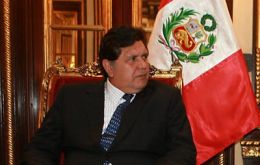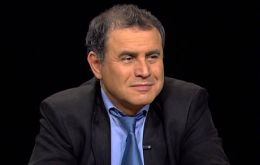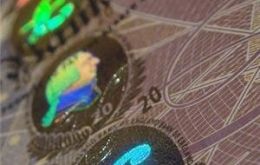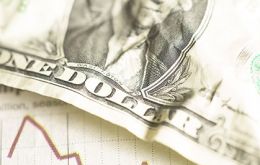MercoPress. South Atlantic News Agency
Economy
-
Monday, November 9th 2009 - 12:41 UTC
G-20 pledged to maintain economic stimulus and asked for IMF monitoring

Finance ministers from the Group of 20 industrialized and emerging market economies pledged to maintain economic stimulus measures until recovery from the global crisis is assured and asked the IMF to assess whether countries were on track for delivering strong, sustainable, and balanced growth to avoid future problems.
-
Saturday, November 7th 2009 - 16:32 UTC
Petrobras testing discovery of “huge” natural gas reserves in Peru’s Amazon

Brazil's Petrobras said on Friday it is still studying drilling results from lot 58 in Peru's Amazon and has yet to estimate natural gas deposits there, a day after Peruvian President Alan Garcia said the company struck a large find.
-
Saturday, November 7th 2009 - 16:16 UTC
Mining and construction backbone of Chile’s economic recovery

Mining and construction industries have led Chile’s economic recovery, according to a recently released economic report.
-
Saturday, November 7th 2009 - 16:12 UTC
British Airways reports record loss and faces threat of strikes

British Airways reported a record pre-tax loss Friday of more than 485 million US dollars, another setback for the airline as it faces the threat of strikes over the Christmas period.
-
Saturday, November 7th 2009 - 14:50 UTC
Roubini warns of an assets bubble because of the dollar-carry trade

The prevalent dollar-carry trade, in which investors borrow US dollars at 0% interest rates, to park in risky assets across the globe could come to an end in the foreseeable future, which may result in a major crash in such risky asset classes such as equities and commodities, according to economist Nouriel Roubini.
-
Saturday, November 7th 2009 - 09:11 UTC
US economy shedding jobs for 22nd month in a row, longest period in 70 years

The unemployment rate in the United States rose to 10.2% in October, which was its highest rate since April 1983, according to figures from the US Labour Department.
Unemployment in September was 9.8%. -
Saturday, November 7th 2009 - 07:07 UTC
EU/Mercosur round of talks agree negotiations remain stalled

The European Union and Mercosur closed on Friday a three-day round of talks unable to re-launch the stalled trade negotiations, although both sides were quick to point out to the “advances” of the last five years.
-
Friday, November 6th 2009 - 16:35 UTC
Bank of England to pump extra £ 25 billion to the economy

The Bank of England voted on Thursday to pump an extra £25 billion into the economy amid concerns over getting the UK's faltering recovery out of recession. The quantitative easing (QE) program aimed at increasing the money supply and helping the economy no stands at £ 200 billion.
-
Friday, November 6th 2009 - 03:49 UTC
Brazilian industry suggests direct negotiations with EU, leaving aside Mercosur

Brazil’s all powerful Sao Paulo Federation of Industries, FIESP, said it is willing to yield positions so a free trade agreement can be reached with the European Union but also suggested Brazil should leave Mercosur aside.
-
Friday, November 6th 2009 - 03:36 UTC
Magallanes Region economy contracted 1.3% from 2004 to 2008

Magallanes Region, in the extreme south of Chile, economic performance from 2004 to 2008 has been one of the worst of the country according to the regional report from Chile’s Central Bank. The region experienced in the period a 1.3% GDP contraction, the only negative result of all Chilean regions.
